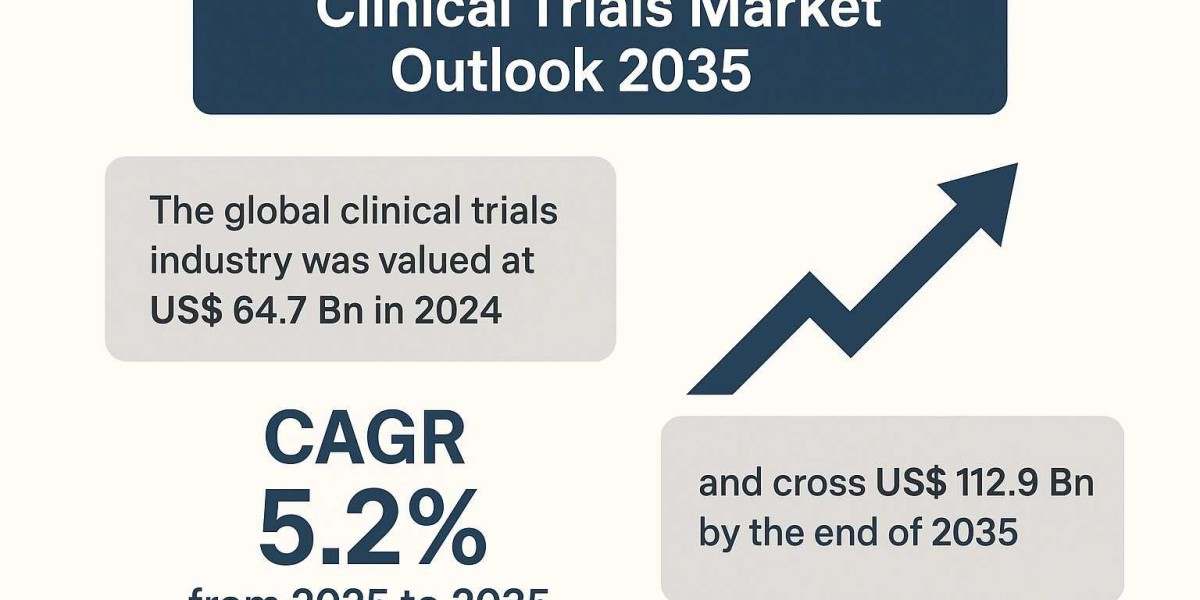The global clinical trials market is entering a transformative decade, characterized by advanced digital integration, patient-centric operating models, and accelerated regulatory collaboration. According to the latest projections, the market, valued at US$ 64.7 billion in 2024, is set to grow at a CAGR of 5.2% from 2025 to 2035, crossing US$ 112.9 billion by the end of 2035. This growth reflects expanding therapeutic pipelines, increased investment in biotechnology, and a decisive shift toward decentralized and hybrid trial structures.
Evolution of the Clinical Trials Ecosystem
Clinical trials are the backbone of medical innovation, providing scientific evidence for the safety and efficacy of drugs, devices, and novel therapies. Traditionally, trials followed a linear path across four main phases—ranging from early safety testing (Phase I) to post-marketing surveillance (Phase IV). However, the new era of trials has evolved beyond traditional models.
Digital recruitment platforms, AI-enabled data analytics, and remote monitoring have reshaped how sponsors design and execute studies. Decentralized trials, using telemedicine, home health visits, and community-based participation, are now enabling faster recruitment and enhanced data reliability.
Moreover, regulatory harmonization across major agencies and risk-based monitoring frameworks have shortened approval timelines, reduced redundancy, and encouraged sponsors to run multiple studies in parallel.
Market Dynamics
Key Drivers
1. Rising Prevalence of Chronic Diseases
The escalating global burden of chronic diseases remains a fundamental growth driver. Cardiovascular diseases, diabetes, cancer, and respiratory disorders are collectively responsible for the majority of healthcare costs and mortality worldwide. According to the World Health Organization, over 14% of adults aged 18 and above had diabetes in 2022—double the rate of 1990. Meanwhile, cancer incidence reached 19.9 million new cases globally in the same year.
As chronic conditions grow more complex with age and comorbidities, pharmaceutical and biotech firms are under pressure to develop more effective therapies. Consequently, clinical trial launches across multiple therapeutic classes have surged. For example, as of September 2025, more than 4,350 trials are actively testing new regimens for breast cancer alone.
2. Increased Focus on Novel Therapies
The rise of cell and gene therapies, biologics, and mRNA-based treatments has created new categories of trials requiring specialized designs. These innovative modalities demand adaptive endpoints, real-world data integration, and extended safety monitoring. As of 2025, over 740 ongoing gene therapy and 5,500 cell therapy trials are in progress globally, representing one of the fastest-growing segments in modern medicine.
3. Technological Integration
The digitization of clinical operations—from eConsent and eSource capture to AI-based patient matching—is fundamentally altering trial efficiency and accuracy. The adoption of interoperable data standards and cloud-based platforms ensures continuity between EDC (Electronic Data Capture), CTMS (Clinical Trial Management Systems), and RTSM (Randomization and Trial Supply Management) systems. These integrations reduce human error, improve auditability, and accelerate decision-making.
4. Outsourcing and Strategic Alliances
Sponsors increasingly rely on contract research organizations (CROs) for full-service trial management, from protocol design to regulatory submission. This shift toward outsourcing enables pharmaceutical companies to focus on core R&D functions while leveraging CRO expertise in patient recruitment, data management, and logistics. Many CROs are adopting integrated alliance models to deliver end-to-end study management with guaranteed performance outcomes.
Emerging Trends
1. Decentralized and Hybrid Trial Models
The COVID-19 pandemic catalyzed a permanent shift toward decentralized trials (DCTs). These models combine virtual consultations, wearable devices, and community-based study hubs to reduce participant burden and increase accessibility. By minimizing travel and time commitments, decentralized trials improve recruitment rates and retention—key pain points in traditional studies.
2. AI-Driven Feasibility and Real-World Evidence (RWE)
Artificial intelligence is now embedded in feasibility assessments, patient identification, and site selection. Predictive algorithms analyze EHR (Electronic Health Record) data to match patients with appropriate studies in real-time. Furthermore, real-world evidence generation is increasingly demanded by regulators and payers, especially in Phase IV post-marketing studies, to evaluate long-term safety and cost-effectiveness.
3. Master Protocols and Adaptive Design
Modern trials are moving away from single-drug, single-disease models. Instead, platform, basket, and umbrella protocols allow simultaneous testing of multiple interventions under one overarching design. These flexible frameworks shorten study timelines, optimize resource use, and improve data comparability.
4. Patient-Centric and Concierge Models
Sponsors are recognizing that trial success depends on patient satisfaction and engagement. The new paradigm emphasizes simplified consent, concierge-style support, and patient engagement platforms that manage travel, reminders, and compensation. This approach minimizes dropout rates and enhances data completeness.
Market Segmentation
By Service Type
The clinical trials market is segmented into several service categories, with major contributors including:
Protocol Designing
Establishing scientific and operational frameworks for trial objectives, inclusion criteria, and endpoints.Patient Recruitment & Site Identification
Leveraging digital tools to identify suitable participants and clinical sites efficiently.Laboratory and Bioanalytical Testing Services
Supporting biomarker evaluation, PK/PD testing, and immunogenicity studies.Clinical Trial Supply & Logistics Services
Ensuring timely distribution of drugs, devices, and materials across global study sites.Data Management and Patient Engagement Services
Integrating AI-based systems for data capture, cleaning, and visualization to ensure integrity and compliance.
By Therapeutic Area
Key focus areas include:
Oncological Disorders
Cardiovascular and Metabolic Diseases
Neurological and Autoimmune Disorders
Respiratory and Infectious Diseases
Pain Management and Others
Among these, oncology dominates due to the high prevalence of cancer and the rise of immunotherapies, precision medicine, and RNA-based treatments.
By Trial Phase
Phase III remains the leading segment, as it represents the most critical stage for demonstrating efficacy and safety on a large scale. These trials often involve thousands of patients across multiple regions and directly influence regulatory approval and market entry.






